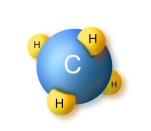
Natural gas is a fossil fuel. This means it originates from the remains of plants and animals that lived many millions of years ago. These organisms were buried and exposed to heat as a result of being highly compressed underneath thousands of meters of soil and rock. These forces transformed the once living organisms into natural gas.
Natural gas is found in reservoirs beneath the surface of the earth. Large layers of rock trap the natural gas as it tries to float to the surface. Although the areas where the gas is trapped are referred to as pools, the natural gas molecules are actually held in small holes and cracks throughout the rock formation.
Geologists, using sophisticated technology, help locate potential pools of natural gas, so they know where to drill a well to extract gas. However, due to the complexity of locating natural gas trapped many meters, and sometimes kilometres, below the surface, the exploration process is not always successful.
Once removed from an underground reservoir, the natural gas is usually transferred to a gas processing plant to remove impurities and by-products. Some of these by-products, including ethane, propane, butane, and sulphur, are extracted for other uses. After being processed, the clean natural gas (almost pure methane) is transported through a network of pipelines and delivered to its point of use, including our homes.
Natural gas is a hydrocarbon, which means it is made up of compounds of hydrogen and carbon. The simplest hydrocarbon is methane; it contains one carbon atom and four hydrogen atoms.
Natural gas can be found by itself or in association with oil. It is both colourless and odourless and is in fact a mixture of hydrocarbons. While mainly methane, the other hydrocarbons include ethane, propane, and butane. Water, oil, sulphur, carbon dioxide, nitrogen, and other impurities may be mixed with the gas when it comes out of the ground. These impurities are removed before the natural gas is delivered to our homes and businesses.
Natural gas can be measured in a variety of ways, although the most common unit of measurement is the Gigajoule (GJ), which signifies one billion joules, the metric measure for heat or energy. Other measures are Mcf (thousand cubic feet) and Btu (British Thermal Unit).
More on Natural Gas.....
Energy in a Cubic Meter of Natural gas
Further Overview of Natural Gas
No comments:
Post a Comment